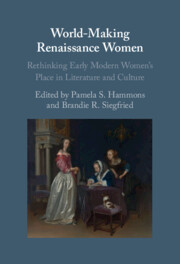Book contents
- World-Making Renaissance Women
- World-Making Renaissance Women
- Copyright page
- Dedication
- Contents
- Figures
- Contributors
- Acknowledgments
- Introduction The Literary Contours of Women’s World-Making
- Part I Early Modern Women Framing the Modern World
- Part II Remaking the Literary World
- Part III Connecting the Social Worlds of Religion, Politics, and Philosophy
- Part IV Rethinking Early Modern Types and Stereotypes
- Chapter 13 Learning to Imitate Women: Male Education and the Grammar of Female Experience
- Chapter 14 Mothers and Widows: World-Making against Stereotypes in Early Modern English Women’s Manuscript Writings
- Chapter 15 Queer Virgins: Nuns, Reproductive Futurism, and Early Modern English Culture
- Chapter 16 Defensor Feminae: Aemilia Lanyer and Rachel Speght
- Chapter 17 Margaret Cavendish’s Melancholy Identity: Gender and the Evolution of a Genre
- Select Bibliography
- Index
Chapter 15 - Queer Virgins: Nuns, Reproductive Futurism, and Early Modern English Culture
from Part IV - Rethinking Early Modern Types and Stereotypes
Published online by Cambridge University Press: 25 November 2021
- World-Making Renaissance Women
- World-Making Renaissance Women
- Copyright page
- Dedication
- Contents
- Figures
- Contributors
- Acknowledgments
- Introduction The Literary Contours of Women’s World-Making
- Part I Early Modern Women Framing the Modern World
- Part II Remaking the Literary World
- Part III Connecting the Social Worlds of Religion, Politics, and Philosophy
- Part IV Rethinking Early Modern Types and Stereotypes
- Chapter 13 Learning to Imitate Women: Male Education and the Grammar of Female Experience
- Chapter 14 Mothers and Widows: World-Making against Stereotypes in Early Modern English Women’s Manuscript Writings
- Chapter 15 Queer Virgins: Nuns, Reproductive Futurism, and Early Modern English Culture
- Chapter 16 Defensor Feminae: Aemilia Lanyer and Rachel Speght
- Chapter 17 Margaret Cavendish’s Melancholy Identity: Gender and the Evolution of a Genre
- Select Bibliography
- Index
Summary
In Shakespeare’s Taming of the Shrew, Petruccio sings a few lines after he arrives home with his reluctant bride Katherina: “It was the Friar of orders gray, / As he forth walked on his way.” These lyrics appear to be a variation on a satirical carol that begins,
- Type
- Chapter
- Information
- World-Making Renaissance WomenRethinking Early Modern Women's Place in Literature and Culture, pp. 244 - 258Publisher: Cambridge University PressPrint publication year: 2021

